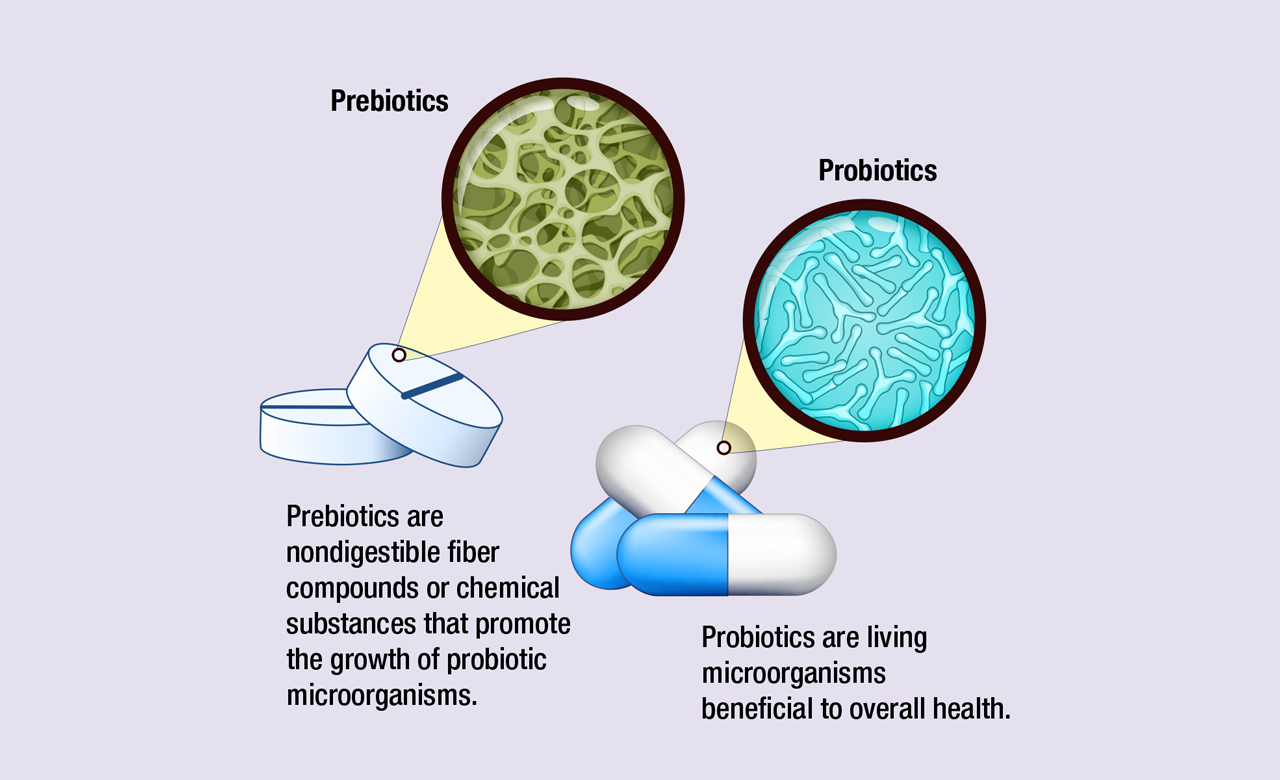Mickle Cathers

Prebiotic dietary supplements boast that they promote digestive health, reduce inflammation, increase energy and drive, and may help with appetite control. All this and they’re also vegan, gluten-free, sugar-free, and keto-friendly. What are prebiotics, anyway?
Background
Prebiotics and probiotics are not the same thing. Probiotics contain live microorganisms meant to maintain or improve normal microflora (i.e., gut bacteria). Prebiotics act as food for gut bacteria and improve the balance of microorganisms. While probiotics are found in foods such as yogurt and sauerkraut, prebiotics are found in typically high-fiber foods including whole grains, asparagus, artichoke, bananas, garlic, onions, and soybeans. Most prebiotic compounds are dietary fibers or other carbohydrates including inulin, fructooligosaccharides, galactooligosaccharides, and lactulose.
Due to the lack of enzymes in our intestines that hydrolyze the polymer bonds of prebiotics, these dietary fibers remain in the GI tract and resist digestion in the small intestine. They reach the colon intact, where they are selectively fermented to produce short-chain fatty acids (SCFAs), including acetate, propionate, and butyrate. These are then absorbed by the intestinal epithelium or transported to the liver, exerting beneficial effects such as regulating immunity, resisting pathogens, improving intestinal barrier function, increasing mineral absorption, and lowering blood lipid levels. The presence of prebiotics in the gut is associated with the production of both protective mucus and anti-inflammatory cytokines. Prebiotics also play a role in the treatment of obesity as SCFAs regulate fat metabolism and are associated with the secretion of satiety hormones, thus preventing overeating.
Is there a benefit?
Research into the relationship between gut microflora and disease is ongoing. A study published on November 22, 2023, in Food Science & Nutrition presented results of a randomized, double-blind clinical trial including 92 patients with coronary artery disease. Liu and colleagues evaluated the effects of 8 weeks of coadministration of prebiotic inulin with probiotics on the endocannabinoid system, gut microbial composition, and inflammatory parameters associated with coronary artery disease. Patients were randomly allocated to receive inulin (15 mg/day), probiotic capsules, or inulin plus probiotic supplements. Results revealed that probiotic–prebiotic cosupplementation significantly decreased serum levels of interleukin-6, toll-like receptor 4, and lipopolysaccharides, while increasing total antioxidant capacity, compared with placebo. Their data provided preliminary evidence that administration of prebiotics with probiotics enhanced and improved the gut barrier, diminished metabolic endotoxemia, and significantly improved the endocannabinoid receptors and inflammatory biomarkers more than either of the two supplementations given alone.
Dosage and availability
Prebiotic supplements are available online and on store shelves in capsules, gummies, and powders, either alone or often in combination with a probiotic product. Prebiotic supplements are mostly just pure fiber extracted from artichoke, acacia, or guar gum and promoted as a daily dose of fiber. These supplements are also sold in travel packets meant to be mixed with 8 oz of a cold beverage or added to a smoothie. Pure inulin powder is also available. Supplement serving sizes range from 3 g to 19 g, while dosages in trials range from 30 g/day to 60 g/day.
What to tell your patients
A healthy and balanced diet will already include prebiotics in the form of foods such as bananas, oats, and other high-fiber vegetables. While a prebiotic supplement is unnecessary for most healthy adults, recommend consultation with a health care provider for those patients wishing to add the supplement to their diet. Prebiotic supplements are generally regarded as safe and adverse effects are rare. However, adding high fiber content such as that found in prebiotic supplements too quickly can result in bloating, cramping, or intestinal gas. Advise patients to drink plenty of water with prebiotic supplementation. ■